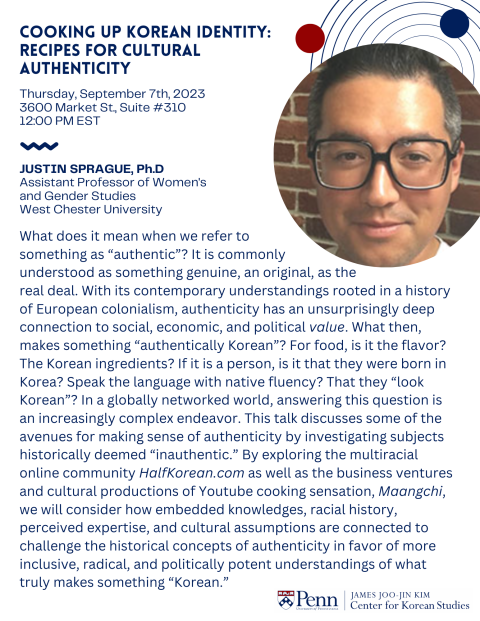
Korean Studies Colloquium
3600 Market Street, Suite 310 Philadelphia, PA 19104
What does it mean when we refer to something as “authentic”? It is commonly understood as something genuine, an original, as the real deal. With its contemporary understandings rooted in a history of European colonialism, authenticity has an unsurprisingly deep connection to social, economic, and political value. What then, makes something “authentically Korean”? For food, is it the flavor? The Korean ingredients? If it is a person, is it that they were born in Korea? Speak the language with native fluency? That they “look Korean”? In a globally networked world, answering this question is an increasingly complex endeavor. This talk discusses some of the avenues for making sense of authenticity by investigating subjects historically deemed “inauthentic.” By exploring the multiracial online community HalfKorean.com as well as the business ventures and cultural productions of Youtube cooking sensation, Maangchi, we will consider how embedded knowledges, racial history, perceived expertise, and cultural assumptions are connected to challenge the historical concepts of authenticity in favor of more inclusive, radical, and politically potent understandings of what truly makes something “Korean.”
Dr. Justin Sprague (he/him) earned his Ph.D. in Women’s Studies from the University of Maryland, College Park, with concentrations in critical race/ethnic studies and material culture. He is an Assistant Professor in the Women’s and Gender Studies Department at West Chester University where he designs and teaches the critical race studies curriculum for the department. Dr. Sprague's research examines the functions of “authenticity” as a mechanism for racial identification and ethnic identity construction. Centering the cultural experiences of Korean Americans, he examines what bodies and identities are considered authentic in racial group/ethnic community contexts, under what parameters that concept is constructed, and in what ways authenticity is moderated through the vehicles of material culture like food and motherwork.
 James Joo-Jin Kim Center for Korean Studies
James Joo-Jin Kim Center for Korean Studies